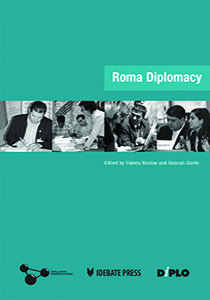Roma Diplomacy is a collection of papers written or inspired through Diplo’s 2005/2006 Roma Diplomacy project.
The volume includes statements by European level civil servants presented at the 2005 Roma Diplomacy conference in Brussels, papers by academics working in the human and Roma rights fields, and research by the participants in the Roma Diplomacy programme themselves, young Roma rights activists from across Europe aimed at promoting awareness of the situation of Roma in different regions and countries. This volume should be of interest to students and practitioners of human rights and diplomacy alike, and it provides practical knowledge for policy makers, Roma, and human rights activists.
Contents
- Andre Liebich: What in the World is Roma Diplomacy?
- Valeriu Nicolae: Towards a Definition of Anti-Gypsyism
- Valeriu Nicolae: On Diplomacy, Roma and Anti-Gypsyism
- Ian Hancock: Our Need for Internal Diplomatic Skills
- David Crowe: You Are Not Alone: A Comparative Look at the History of East European Roma and African-Americans in the United States
- Florin Botonogu: The Indigenous People’s Movement – A Possible Example for Promoting Roma Issues in the United Nations
- Bernard Rorke: No Longer and Not Yet: Between Exclusion and Emancipation
- Eva Sobotka: Opportunities and Limitations for International Organisations in Addressing the Situation of Roma and Travellers in Europe
- Marcel Dediu: The European Union: A Promoter of Roma Diplomacy
- Asmet Elezovski: Roma Integration in the European Union
- Valery Novoselsky: The Internet and Public Diplomacy in the Formation of Non-Territorial Roma Nation
- Saimir Mile: Rroma and Rroma-Related Groups: The Result of a Forced Naturalization under the Pressure of Politically Correct Vocabulary
- Gabriela Hrabanova: Anti-Gypsyism in the Czech Republic
- Janette Gronfors: Roma Women’s Participation in Finnish Society
- Gyula Vamosi: Removing the Veil over European Union Monies: Challenges of Roma to Access of Structural Funds in Hungary
- Ibrahim Ibrahimi: Roma and their Participation in Public Administration in Macedonia
- Sakibe Jashari: Together in Alliance – The Roma Ashkali Egyptians of Kosovo: The Challenges of a Unified Political Party
- Josep Borrell Fontelles: Roma Diplomacy Conference Opening Address
- Alliance of Liberals and Democrats for Europe: Liberals Demand Greater Participation of the Roma Community in Europe’s Political Process
- Beate Winkler: The Role of Diplomacy and International Action in Curbing Anti-Gypsyism in Europe
- Richard Corbett: How can Roma Diplomacy use the European Parliament?
- Lisa Pavan-Wolfe: Roma Women in Diplomacy and Politics
- Elly Rijnierse: The Role of Civil Society in Facilitating the Transition to Equal Opportunities for Roma
- Vladimir Spidla: Roma Diplomacy Conference Concluding Address
- Roma Diplomacy Conference Participants: Final Recommendations







